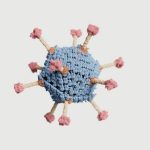Scientists uncover cause of Covid-19 diarrhea, pointing to potential treatments
Researchers at Johns Hopkins Medicine have discovered how COVID-19 causes diarrhea, offering clues for potential treatments.
By using human stem cells to create a "mini...
Scientists discover fruits and vegetables as a natural remedy for hypertension and kidney health
A five-year study has shown that eating fruits and vegetables can greatly benefit people with hypertension.
Doctors recommend making these foods a key part of...
Scientists find key to snap bean’s stress resistance and herbicide tolerance
Waterhemp is a troublesome weed for farmers, especially those growing snap beans.
During harvest, waterhemp stems can break off and contaminate the crop with inedible...
Scientists create soft gold nanowires for better neural implants
Scientists at Linköping University in Sweden have made a significant breakthrough by creating gold nanowires and developing soft electrodes that can connect to the...
This is when most blood thinner dosing problems happen
Millions of Americans rely on blood thinners, or anticoagulants, to prevent dangerous blood clots that can lead to heart attacks and strokes.
Among these, more...
Diet, exercise and ‘The Stents’ contributed to his recovery after a massive heart attack
One New Year's Day, Rick St. Sauveur pulled a 10-hour shift at the supermarket where he was an assistant manager.
He felt great, even after...
Common causes of delirium in older people
Delirium is a sudden change in a person's mental state that can cause confusion, disorientation, and difficulty focusing.
It can be frightening for both the...
Research finds new biomarker for early detection of Alzheimer’s disease
Alzheimer’s disease is a progressive neurodegenerative disorder that impacts millions of people worldwide, leading to cognitive decline, memory loss, and other neurological symptoms.
It is...
Lower BMI linked to early signs of cognitive impairment
Body mass index (BMI) is a number calculated from a person's weight and height.
It is determined by dividing the weight in kilograms by the...
9 in 10 people need better treatment for high blood pressure
Researchers from the University of Gothenburg have found that many individuals with high blood pressure, or hypertension, may require more intensive treatment to reduce...










